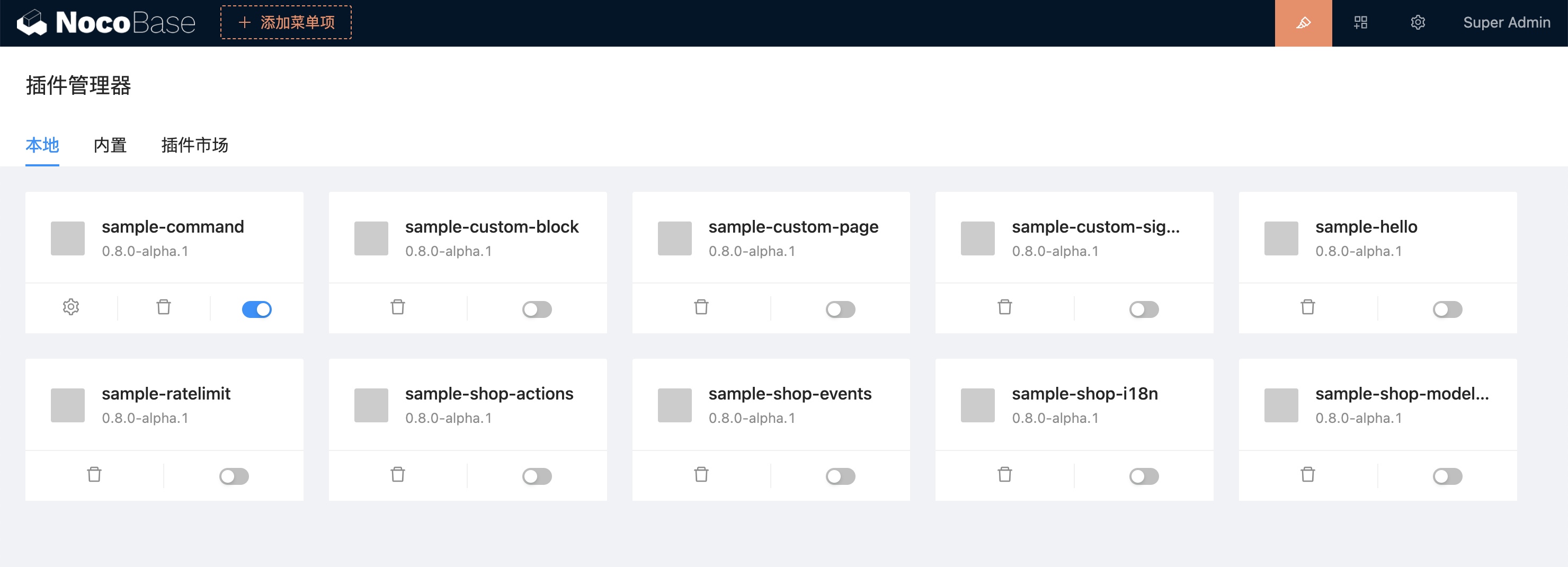6.0 KiB
v0.8:Plugin manager & docs
Starting with v0.8, NocoBase begins to provide an available plugin manager and development documentation. Here are the main changes in v0.8.
Tweaks to the top right corner of the interface
- UI Editor
- Plugin Manager
- Settings Center
- Personal Center

The new plugin manager
v0.8 provides a powerful plugin manager for managing plugins in a no-code way.
Plugin manager flow

Plugin Manager interface
Currently it is mainly used for disabling, activating and deleting local plugins. Built-in plugins cannot be deleted.

Plugin Manager command
In addition to being able to activate and disable plugins from the no-code interface, you can also manage plugins more completely from the command line.
# Create a plugin
yarn pm create hello
# Register the plugin
yarn pm add hello
# Activate the plugin
yarn pm enable hello
# Disable the plugin
yarn pm disable hello
# Remove the plugin
yarn pm remove hello
Note: Releases and upgrades for plugins will be supported in subsequent releases.
# Publish the plugin
yarn pm publish hello
# Publish the plugin
yarn pm upgrade hello
For more plugin examples, see packages/samples.
Changes of plugin
Plugin’s directory structure
|- /hello
|- /src
|- /client # Plugin client
|- /server # Plugin server
|- client.d.ts
|- client.js
|- package.json # Plugin package information
|- server.d.ts
|- server.js
Plugin’s name specification
NocoBase plugin is also an NPM package, the correspondence rule between plugin name and NPM package name is ${PLUGIN_PACKAGE_PREFIX}-${pluginName}.
PLUGIN_PACKAGE_PREFIX is the plugin package prefix, which can be customized in .env, click here for PLUGIN_PACKAGE_PREFIX description.
For example, a project named my-nocobase-app adds the hello plugin with package name @my-nocobase-app/plugin-hello.
PLUGIN_PACKAGE_PREFIX is configured as follows.
PLUGIN_PACKAGE_PREFIX=@nocobase/plugin-,@nocobase/preset-,@my-nocobase-app/plugin-
The correspondence between plugin names and package names is
usersplugin package name is@nocobase/plugin-usersnocobaseplugin package name is@nocobase/preset-nocobasehelloplugin package named@my-nocobase-app/plugin-hello
Plugin’s lifecycle
v0.8 provides a more complete approach to the plugin lifecycle.
import { InstallOptions, Plugin } from '@nocobase/server';
export class HelloPlugin extends Plugin {
afterAdd() {
// After the plugin has been added via pm.add
}
beforeLoad() {
// Before all plugins are loaded, generally used to register classes and event listeners
}
async load() {
// Load configuration
}
async install(options?: InstallOptions) {
// Install logic
}
async afterEnable() {
// After activation
}
async afterDisable() {
// After disable
}
async remove() {
// Remove logic
}
}
export default HelloPlugin;
Front- and back-end entrance for plugins
The lifecycle of the plugin is controlled by the server
import { Application } from '@nocobase/server';
const app = new Application({
// ...
});
class MyPlugin extends Plugin {
afterAdd() {}
beforeLoad() {}
load() {}
install() {}
afterEnable() {}
afterDisable() {}
remove() {}
}
app.plugin(MyPlugin, { name: 'my-plugin' });
The client side of the plugin exists as Context.Provider (similar to Middleware on the server side)
import React from 'react';
import { Application } from '@nocobase/client';
const app = new Application({
apiClient: {
baseURL: process.env.API_BASE_URL,
},
dynamicImport: (name: string) => {
return import(`../plugins/${name}`);
},
});
// When you visit the /hello page, it displays Hello world!
const HelloProvider = React.memo((props) => {
const location = useLocation();
if (location.pathname === '/hello') {
return <div>Hello world!</div>
}
return <>{props.children}</>
});
app.use(HelloProvider);
Custom business code
v0.7 plugins are not complete, custom business code may be scattered in packages/app/client and packages/app/server, which is not conducive to upgrade and maintenance. v0.8 recommends organizing as a plugin package and using yarn pm to manage plugins.
More complete documentation is provided
- Welcome: a quick look at NocoBase
- Manual: learn more about the core features provided by the NocoBase platform
- Plugin Development Tutorial: Advanced dive into plugin development
- API Reference: Check the API usage during plugin development
- Client Components Library (in preparation): provides examples and usage of NocoBase components
More plugin examples are provided
- command
- custom-block
- custom-page
- custom-signup-page
- hello
- ratelimit
- shop-actions
- shop-events
- shop-i18n
- shop-modeling
Other new features and functionality
- Import from Excel
- Bulk Update & Edit
- Graphical collection
- Workflow support for viewing execution history
- JSON field